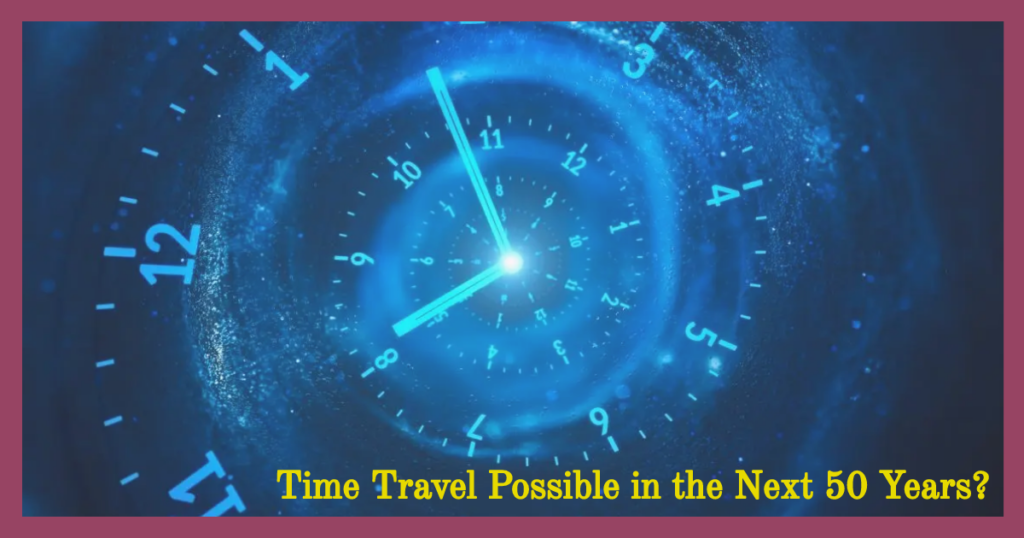The Future of Traveling:
Explore the possibilities of time travel in the next 50 years and its potential impact on the future of travel. Find out what experts have to say about this intriguing concept and how it could revolutionize the way we explore the world.
In a world full of technological advancements and scientific breakthroughs, the concept of time travel continues to capture our imagination. The ability to journey through time, visiting the past or future, has been a popular theme in science fiction for decades. But what if time travel became a reality? How would it impact the future of travel? In this article, we will delve into the fascinating realm of time travel and explore its potential implications for the Time Travel Possible in the Next 50 Years?
What Would be the Future of Traveling?
The concept of time travel opens up a world of possibilities for the future of travel. From exploring historical events to experiencing destinations that haven’t even been discovered yet, time travel could revolutionize the way we satiate our wanderlust. However, the question remains: Is time travel even possible in the next 50 years?
The Science Behind Time Travel
To understand the feasibility of time travel, we need to delve into the scientific theories that underpin this concept. According to Einstein’s theory of general relativity, time is not a constant but can be influenced by gravity and velocity. This theory forms the basis for the possibility of time dilation and, subsequently, time travel.
Time Travel and Technological Advancements
With rapid advancements in technology, the possibility of time travel becoming a reality in the next 50 years cannot be entirely dismissed. Scientists and researchers are continually pushing the boundaries of our understanding of time and exploring avenues that could potentially make time travel feasible.
The Potential Impact of Time Travel on Traveling
If time travel were to become a reality, it would undoubtedly have a profound impact on the way we travel. Let’s explore some potential implications of time travel on the future of traveling.
1. Discovering Historical Events Firsthand
One of the most exciting prospects of time travel is the ability to witness historical events firsthand. Imagine walking alongside the ancient Egyptians as they built the pyramids or experiencing the Renaissance era in all its artistic glory. Time travel would enable travelers to immerse themselves in the rich tapestry of human history and gain a deeper understanding of our past.
2. Exploring Future Destinations
Time travel could also open up the possibility of exploring future destinations. Imagine venturing into the year 2050 and experiencing cities that haven’t even been built yet or witnessing advancements in architecture, technology, and culture that are yet to unfold. This form of exploration would be unparalleled, offering travelers a glimpse into a world that lies beyond their current reality.
3. Time Tourism: A New Industry
If time travel were to become a reality, it would undoubtedly give rise to a whole new industry: time tourism. Just as we have travel agencies and tour operators today, specialized companies could emerge to curate time travel experiences. Travelers would have the opportunity to book trips to specific time periods or events, creating a unique niche in the travel market.
4. Ethical Considerations
While time travel presents exciting possibilities, it also raises ethical considerations. Altering the course of history or interfering with past events could have unforeseen consequences. Striking a balance between exploration and preserving the integrity of historical events would be crucial in the future of time travel.
Expert Opinions on the Feasibility of Time Travel
Given the complexity of time travel, it’s essential to consider the opinions of experts in the field. Let’s explore what some experts have to say about the feasibility of time travel in the next 50 years.
1. Dr. Elizabeth Greene, Theoretical Physicist
According to Dr. Greene, while time travel remains an intriguing concept, the technological challenges are immense. She believes that achieving time travel within the next 50 years is highly unlikely due to the current limitations in our understanding of space-time.
2. Professor Jonathan Adams, Temporal Studies Specialist
Professor Adams acknowledges the tantalizing possibilities of time travel but emphasizes the need for significant scientific breakthroughs. He suggests that while the next 50 years may bring advancements in our understanding of time, practical time travel remains a distant dream.
3. Dr. Sofia Patel, Quantum Mechanics Researcher
Dr. Patel remains cautiously optimistic about the future of time travel. She highlights the ongoing advancements in quantum mechanics and the potential for groundbreaking discoveries. However, she cautions that substantial technological and theoretical developments are necessary before time travel becomes a reality.
Let’s include Stefan Hankin’s opinion on time travel:
4. Stefan Hankin, Scientist, and Futurist
Stefan Hankin, a prominent scientist, and futurist, brings a unique perspective to the concept of time travel. According to him, while time travel remains a captivating idea, it is highly improbable within the next 50 years. Hankin explains that the challenges of bending space-time and creating stable wormholes, which are often depicted in science fiction, are far beyond our current technological capabilities.
Hankin emphasizes the importance of distinguishing between the realms of scientific exploration and fictional storytelling. While the possibilities of time travel fire our imaginations, he cautions against setting unrealistic expectations. Hankin believes that our efforts should focus on deepening our understanding of the universe and pushing the boundaries of scientific knowledge. While he doesn’t rule out the potential for future breakthroughs, he emphasizes the need for patience and continued scientific exploration in the realm of time travel.
Stefan Hankin’s opinion aligns with other experts who believe that achieving practical time travel within the next 50 years is highly unlikely. Despite the captivating nature of the concept, significant technological advancements and a deeper understanding of space-time would be necessary to make time travel a reality. As we navigate the future of traveling, it’s important to temper our expectations while remaining open to the possibilities that scientific progress may bring.
Conclusion
While the future of time travel remains uncertain, it continues to captivate our imagination and spur scientific inquiry. The next 50 years hold immense potential for technological advancements and scientific breakthroughs, which could inch us closer to realizing the dream of time travel. As we navigate the future of traveling, it’s essential to ponder the possibilities and implications that time travel could bring to our journeys through time.
FAQs
Time Travel Possible in the Next 50 Years?
1Q: Is time travel scientifically possible?
A: While time travel remains a subject of scientific speculation and exploration, its feasibility within the next 50 years is uncertain. Significant technological advancements and a deeper understanding of space-time would be necessary to achieve practical time travel.
2Q: What are the potential benefits of time travel for travelers?
A: Time travel could offer unique opportunities to explore historical events firsthand and witness future destinations. It could also give rise to a new industry focused on time tourism, providing travelers with unprecedented experiences.
3Q: What are the ethical implications of time travel?
A: Time travel raises ethical considerations, as altering the past could have unforeseen consequences. Striking a balance between exploration and preserving the integrity of historical events would be crucial.
4Q: Are there any ongoing research efforts in the field of time travel?
A: Yes, scientists and researchers continue to explore the concept of time travel through theoretical physics, quantum mechanics, and the study of space-time. Ongoing research aims to deepen our understanding of these phenomena and uncover potential avenues for time travel.
5Q: Could time travel revolutionize the tourism industry?
A: Time travel has the potential to revolutionize the tourism industry by offering unique and immersive experiences. It could create a new niche in the market, catering to travelers seeking extraordinary journeys through time.
6Q: What challenges need to be overcome for time travel to become a reality?
A: Time travel faces significant challenges, including technological limitations, the preservation of historical integrity, and the unraveling of complex scientific theories. Overcoming these challenges would be essential for time travel to become feasible.



